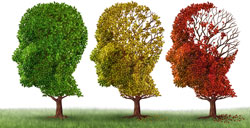DO NOT TAKE THIS COURSE! Please go to the course menus (All Courses, State Mandated, ...) to find current options.

Shutterstock
Author: Lauren Robertson, BA, MPT
Contact hours: 1
Expiration date: June 1, 2025
Course price: $10*
*Register or login when you reach the last chapter.
Course Summary
For healthcare workers, providers, and caregivers who have direct contact with people with dementia. The course will increase your awareness and understanding of Alzheimer’s disease and related disorders.
The course defines dementia, describes how dementia affects the brain, and discusses how the symptoms of dementia differ from normal age-related changes. It describes the stages of dementia along with symptoms and behaviors you might see during the different stages. In addition, the course discusses communication challenges at the different stages of dementia, including patients with dementia who are receiving hospice, and provides tips for communicating with people at those different stages.
For Mail Order
To register and pay via U.S. mail, please download the PDF below and follow the written instructions.
![]() Rhode Island: Alzheimer's Disease and Related Disorders, 1 unit
Rhode Island: Alzheimer's Disease and Related Disorders, 1 unit
Criteria for Successful Completion
Study the course material, achieve a score of 80% or higher on the post test (the post test can be repeated if a learner scores less that 80%), complete the course evaluation, and pay where required. No partial credit will be awarded.
Accreditation
To find specific accreditations or approvals, click here.
Course Objectives
When you finish this course you will be able to*:
- Name 3 properties of dementia.
- Name 3 differences between normal, age-related changes and the changes seen in dementia.
- Describe the first symptom you are likely to notice in someone in the early stage of Alzheimer’s disease.
- Give one characteristic each for Alzheimer’s, frontal-temporal, vascular, and Lewy body dementia.
- Relate 1 symptom and behavioral change at each stage of Alzheimer’s disease
- Describe 2 challenges facing caregivers at each stage of dementia.
- Outline 3 strategies for communicating with residents at each stage of dementia.
- Describe 4 problems faced by someone caring for a family member with dementia who is also on hospice.
*Please note: attainment of course objectives will be assessed in the course evaluation.
